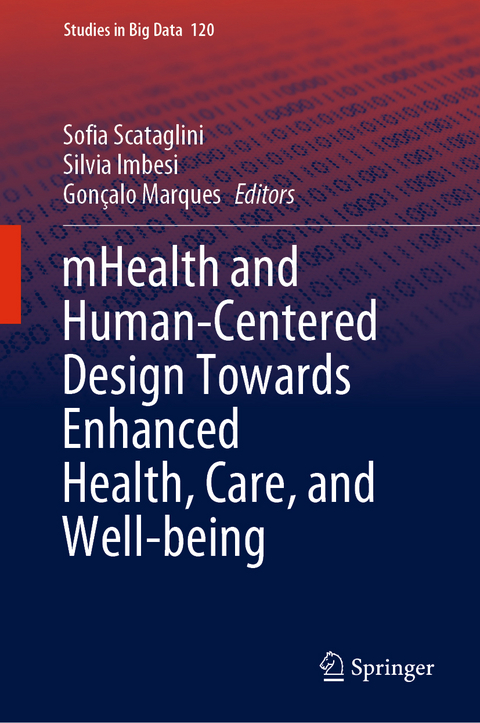
mHealth and Human-Centered Design Towards Enhanced Health, Care, and Well-being
Springer Verlag, Singapore
978-981-99-3988-6 (ISBN)
Furthermore, the covered topics are described in their current applications in relevant fields focusing on the design of smart solutions, such as biomonitoring systems, activity recognition tools, smart living environments, physical autonomy, and virtual assistance.
This editorial project is addressed to academics, designers, engineers, and practitioners in health care who want to promote cooperation between academia, stakeholders, and research institutions.
Sofia Scataglini is a Biomedical Engineer and Visiting Professor at Antwerp University in the Faculty of Medicine and Health Sciences, Department of Rehabilitation Sciences and Physiotherapy, Antwerp, Belgium. Prof. Sofia Scataglini is recognized with the title of European Ergonomist (Eur. Erg.), CREE. In doing so, she is a member of the Scientific Committee of the International Ergonomics Association (IEA) and Chair of the IEA Technical Committee on Digital Human Modeling and Simulation. Sofia is the founder of the Digital Human Modeling by Women group (DHMW), which is dedicated to promoting women in STEAM around the world. Sofia organizes congresses related to applied human factors, ergonomics, wearables, and digital human modeling (DHM). She is involved in different TC groups for standardization, such as at the national (NBN), European (CENELEC), and international levels (ISO and IEC) for ergonomics, biomechanics, wearables, smart textiles, PPE, and clothing. She is also an active editor, writer, and reviewer of books and journals and scientific grants focusing on sensors, medicine, health and care, modeling and simulation, standardization, ergonomics, biomechanics, and design. Her research activities focus on the research and design of products, systems, environments, and services for the health, care, and well-being of people using co-design and user-centered design methods combined with ergonomics. Silvia Imbesi is Architect and Industrial Designer. Currently, she works as Research Fellow in Inclusive Design at the Department of Architecture of the University of Ferrara, Italy. She is an expert in user-centered methodologies for the design of products, services, and systems. She uses to develop design projects for niche users belonging to fragile categories, particularly in healthcare devices related to the Internet of Things. Since 2009, Silvia Imbesi has worked as Freelance Architect and Designer, collaborating with other professionals, companies, industries, and institutions for the development of projects and design research. Starting in 2012, she collaborated with the University of Ferrara as Contract Professor and participated in several kinds of research related to user-centered methodologies and inclusive devices related to the Internet of Things, innovative teaching methods, etc. Silvia Imbesi authored many international publications about Human-Centered Design, inclusive design, the Internet of Things, wearable devices, human factors, mHealth systems, data visualization, etc. Gonçalo Marques holds a Ph.D. in Computer Science Engineering and is Senior member of the Portuguese Engineering Association (Ordem dos Engenheiros). He is currently working as Assistant Professor lecturing courses on programming, multimedia, and database systems. Furthermore, he worked as a Software Engineer in the Innovation and Development unit of Groupe PSA automotive industry from 2016 to 2017 and in the IBM group from 2018 to 2019. His current research interests include the Internet of Things, Enhanced Living Environments, machine learning, e-health, telemedicine, medical and healthcare systems, indoor air quality monitoring and assessment, and wireless sensor networks. He has more than 80 publications in international journals and conferences, is a frequent reviewer of journals and international conferences and is also involved in several edited books projects.
mHealth in Ageing: from data to scenario-based service design.- A Human-Centered Design Framework for mHealth in Healthcare to Increase Healthy Aging.- Involving End Users in Risk-based Co-design.- Instruments for human-centered design research in mhealth: merging QFD and Participative approach.- Artificial Intelligence applications and Social Assistive Robotics to counteract cognitive decline in the older population: evidence from trials in real settings
| Erscheinungsdatum | 11.08.2023 |
|---|---|
| Reihe/Serie | Studies in Big Data |
| Zusatzinfo | 32 Illustrations, color; 5 Illustrations, black and white; XII, 200 p. 37 illus., 32 illus. in color. |
| Verlagsort | Singapore |
| Sprache | englisch |
| Maße | 155 x 235 mm |
| Themenwelt | Informatik ► Weitere Themen ► Bioinformatik |
| Medizin / Pharmazie ► Gesundheitswesen | |
| Medizin / Pharmazie ► Pflege | |
| Technik ► Elektrotechnik / Energietechnik | |
| Technik ► Nachrichtentechnik | |
| Wirtschaft | |
| Schlagworte | Activity Monitoring Devices and Systems • Autonomous Activity Recognition • mHealth and/or eHealth Solutions • Pervasive technologies • Smart Clothing and Smart Materials • Telemedicine and e-Health |
| ISBN-10 | 981-99-3988-7 / 9819939887 |
| ISBN-13 | 978-981-99-3988-6 / 9789819939886 |
| Zustand | Neuware |
| Informationen gemäß Produktsicherheitsverordnung (GPSR) | |
| Haben Sie eine Frage zum Produkt? |
aus dem Bereich


